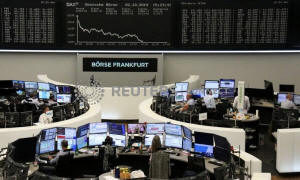Trade fears, growth woes haunt global stocks as bond yields slide
 Send a link to a friend
Send a link to a friend
 [October 03, 2019]
By Karin Strohecker [October 03, 2019]
By Karin Strohecker
LONDON (Reuters) - World stocks hovered
near four-week lows on Thursday and yields on major benchmark bonds
slipped after Washington moved to impose new tariffs on European goods,
fuelling fears about global growth and dousing risk appetite.
MSCI's index of world stocks <.MIWD00000PUS> slipped 0.1%, with Asian
shares plunging. Japan's Nikkei stock index <.N225> closing down 2%, its
biggest one-day decline since Aug. 26.
However, European stocks eked out small gains after suffering their
worst day since last December on Wednesday, when the U.S. got the
go-ahead to impose tariffs on $7.5 billion of European goods.
Washington will enact 10% tariffs on Airbus <AIR.PA> planes and 25%
duties on French wine, Scotch and Irish whiskies and cheese from across
the continent as punishment for illegal EU subsidies to Airbus.

But a reduction in the initial list propped up some sectors with the
pan-regional STOXX 600 index <.STOXX> up 0.2%, torn between falls in
financials and gains in luxury goods stocks. France's CAC index <.FCHI>
rose 0.7% while Britain's FTSE 100 <.FTSE> fell 0.5%. German bourses - a
weather vane for exports - were closed for a national holiday.
The latest U.S.-European trade tensions added to fears over the standoff
between Washington and Beijing, which has cast a shadow over global
growth prospects. Earlier in the week, disappointing data on U.S.
manufacturing and the jobs market suggested the trade war with China had
damaged the world's largest economy.
"The big question for a lot of folks is whether this is the third
slowdown since the financial crisis or are we now heading for a global
recession," said Anujeet Sareen, a fixed income portfolio manager and
global macro strategist for Brandywine Global. "The wild card in the
pack is always Donald Trump and whatever he tweets next."
U.S. stock futures <ESc1> <NQc1> indicated 0.4% higher, after shares
fell the most in nearly six weeks on Wednesday. All three major New York
share indexes lost more than 1.5%.
"Risk aversion is broadly on the rise and that has been triggered by the
weakness in U.S. manufacturing ISM data earlier this week," said Manuel
Oliveri, an FX strategist at Credit Agricole in London.
[to top of second column]
|

The German share price index DAX graph is pictured at the stock
exchange in Frankfurt, Germany, October 2, 2019. REUTERS/Staff/File
Photo

"The outperformance of the U.S. economy compared to other major
economies has held the dollar and other risky assets up but that has
changed this week."
The flight to safety saw yields on two-year U.S. Treasury yields
<US2YT=RR> slip to 1.4680%, nearing a two-year low of 1.4280%.
Adding to pressure on yields was a weak U.S. jobs report, boosting
expectations the Federal Reserve will cut interest rates this month.
Traders see a 72.8% chance the Fed will cut rates by 25 basis points
to 1.75%-2.00% in October, up from 39.6% on Monday, according to CME
Group's FedWatch tool.
Bets on a rate cut could rise further if a U.S. non-farm payrolls
report on Friday shows weakness in the labor market.
Government bond yields in safe-haven Germany <DE10YT=RR> fell for
the first time in over a week.
In currency markets, the dollar dipped to one-week lows against the
euro and yen. The greenback crossed 107 Japanese yen <JPY=EBS> and
touched a week low of 106.95 yen before recovering some ground. It
fell to $1.0973 per euro <EUR=>. The dollar index <.DXY> slipped
0.1%.
Meanwhile, sterling <GBP=> was flat at $1.2306 as investors waited
for a European Union response to Britain's latest Brexit offer,
which Prime Minister Boris Johnson offered on Wednesday.
So far, the last-ditch Brexit proposal has received a cool
reception. One senior EU official said it "can't fly" because it was
an unworkable move backwards that left Britain and the EU far apart.
Brent crude <LCOc1> was flat at $57.84 per barrel. Energy traders
are worried about a slowing global economy, an over-supplied market
and geopolitical friction in the Middle East.

(Reporting by Karin Strohecker, additional reporting by Stanley
White in Tokyo, Marc Jones and Saikat Chatterjee in London; editing
by Larry King)
[© 2019 Thomson Reuters. All rights
reserved.]
Copyright 2019 Reuters. All rights reserved. This material may not be published,
broadcast, rewritten or redistributed.
Thompson Reuters is solely responsible for this content. |